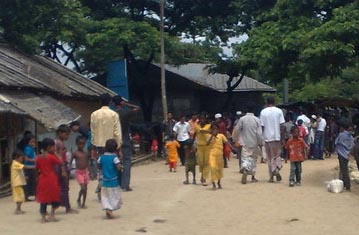Twenty-five year-old Abdul (not his real name) and other refugees who have been living in small sheds in Bangladesh for over 20 years had high hopes and dreams that the situation in Burma’s northern Arakan State, their homeland, would be changed after the 2010 elections. However, what they see is ongoing human rights abuses and discrimination against Rohingya people, so the situation is actually becoming worse day-by-day in Arakan State, Abdul said in a recent interview.

“Other refugees and I came to Bangladesh from Burma in 1991 and 1992 because of religious persecution and other human rights abuses such as forced labor, restrictions on our movement, marriage, and education, as well as land confiscation, arbitrary arrest and extortion, and because of denied rights of citizenship with ethnicity and equal rights in Arakan State.”
Abdul lives with his parents and elder brother in a small shed at Nayapara Official Refugee Camp under the supervision of UNHCR and the Bangladesh authorities.
“I live in a refugee camp in Bangladesh. I learnt up to class five in the camp, but I could not acquire higher education and could not go to high school or college because the Bangladesh authorities do not provide opportunities [for refugees] to get higher education.”
“The authorities only provide informal schools up to class five in the official Kutupalong and Nayapara camps.
“I hoped that it was a good chance for me and other refugees when the resettlement program was started by the United Nations High Commissioner for Refugees (UNHCR) in 2006. I had also a dream and hope to go to abroad to another country through the UNHCR and learn more and more. But I couldn’t.”
According to a report titled Refugee Resettlement Statistics of IOM, the total figure of resettled Rohingya refugees from refugee camps in Bangladesh from 2006-2010 is 926. Most of them have been accepted by Canada, the United Kingdom, Australia, Norway, Ireland, New Zealand, Sweden, and the USA.
A Rohingya man who has arrived in a third country said, “We are enjoying our rights in a third country, and also can study here freely. But we are very sad because very few Rohingya refugees have been resettled in third countries.”
A schoolteacher from Nayapara Camp says, unfortunately, the resettlement program was halted by the Bangladeshi authorities in 2010 for unknown reasons.
The schoolteacher also says that those who continue living in Bangladeshi refugee camps are unable to see any future for the next generations.
However, the newly formed government of Burma has agreed to take back Rohingya refugees currently staying at two refugee camps in Cox's Bazar under the UNHCR, but no decision has been made concerning the large number of unregistered Rohingya living in Bangladesh, Foreign Secretary Mijarul Quayes told a news conference on October 15.
“Although the undocumented Burmese nationals do not have refugee status, we are not forcing them out of the country on humanitarian grounds,” Quayes said, adding that the Burmese authorities have agreed to discuss the undocumented Burmese refugees (mostly Rohingya) in the future.
Quayes also said Prime Minister Sheikh Hasina will visit Burma shortly, but the date for the visit has not been set. He expressed hope that during the visit, many bilateral issues, including border trade and coastal shipping, will be resolved.
Bangladesh’s Foreign Minister Dipo Moni yesterday told Assistant High Commissioner for Refugees Janet Lim that Bangladesh will not pursue a policy of forced Rohingya refugee repatriation.
Dipu Moni also said on November 20, that as a principled position, Bangladesh has never pursued ‘forced repatriation’ of refugees, according to a Foreign Ministry press release.
Bangladesh has been cooperating with the UNHCR to support the voluntary repatriation of the Rohingya refugees through diplomatic negotiations with Burma, Moni said.
All future repatriation of Rohingya to Burma should remain strictly voluntary, UNHCR Assistant High Commissioner Janet Lim stressed.
According to a group of refugees, “We will go back to our motherland if the Burmese authorities gives us citizenship with Rohingya ethnicity and equal rights as other ethnics groups.”
The refugees have the following demands:
(1) To be recognized as citizens of Burma with Rohingya ethnicity by the UN-recognized democratic government of Burma
(2) To have equal rights like other ethnic groups in Burma
(3) To be provided compensations and returns of confiscated lands and other properties
(4) To see an end to human rights violations and racial discrimination, especially against Rohingya
(5) To have all political prisoners in Burma released, and for the government to give status to exiled Rohingya who live outside of Burma
(6) Not to be forcefully repatriated by Bangladeshi authorities.
A politician on condition of anonymity said that if the Burmese authorities do not grant full citizenship with ethnicity and equal rights to the Rohingya refugees, the refugees will never go back to Burma.
“More than 28,000 Rohingya are still living in two camps — Nayapara and Kutupalong — run by the UNHCR in Cox's Bazar. These are the remnants of some nearly 300,000 refugees who flocked into Bangladesh in 1991–92, alleging persecution by Burma’s military regime. Most of them were repatriated following the UNHCR's mediation.”
The politician also said, “We fled to Bangladesh from Burma because of persecution and human rights abuses by the military regime. We will not jump again into the same persecution and human rights abuses by the military regime. We would rather die in Bangladesh or elsewhere.”
Abdul and other refugees would like to urge the international community, the UNHCR, and Bangladeshi authorities to work to solve the Rohingya problem and to urge the Burmese authorities to recognize their citizenship with Rohingya ethnicity in Burma before any repatriation programs from Bangladesh are started.



